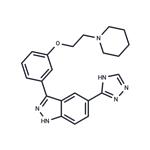c-Jun N-terminal kinases (JNKs) are MAP kinase family members that become highly activated after cells are exposed to stress conditions and are poorly activated by exposure to growth factors or mitogens. CC-401 is a potent inhibitor of all three JNK isoforms (Ki values range from 25 to 50 nM). It has at least 40-fold selectivity for JNK compared with other related kinases. CC-401 is bioavailable when delivered by gavage, blocking JNK signaling and renal fibrosis in a rat obstructed kidney model. It also has been shown to decrease hepatic necrosis and apoptosis after orthotopic liver transplantation and prevent acute renal failure following ischemia/reperfusion associated with renal transplantation in rats.
CC-401 inhibits c-JUN N-terminal kinases (JNKs) by binding to its ATP-binding site. JNKs belong to the MAP kinase family and respond to stress signals such as heat, cytokines, and osmotic shock.
ChEBI: 3-[3-[2-(1-piperidinyl)ethoxy]phenyl]-5-(1H-1,2,4-triazol-5-yl)-1H-indazole is a member of pyrazoles and a ring assembly.
[1] ma f y, flanc r s, tesch g h, et al. a pathogenic role for c-jun amino-terminal kinase signaling in renal fibrosis and tubular cell apoptosis. journal of the american society of nephrology, 2007, 18(2): 472-484.
[2] flanc r s, ma f y, tesch g h, et al. a pathogenic role for jnk signaling in experimental anti-gbm glomerulonephritis. kidney international, 2007, 72(6): 698-708.
[3] bogoyevitch m a, arthur p g. inhibitors of c-jun n-terminal kinases—junk no more biochimica et biophysica acta (bba)-proteins and proteomics, 2008, 1784(1): 76-93.
![3-[3-[2-(1-Piperidinyl)ethoxy]phenyl]-5-(1H-1,2,4-triazol-5-yl)-1H-indazole Structure](/CAS2/GIF/395104-30-0.gif)

![3-[3-[2-(1-Piperidinyl)ethoxy]phenyl]-5-(1H-1,2,4-triazol-5-yl)-1H-indazole pictures](https://img.chemicalbook.com/ProductImageEN/2019-12/Small/c4648242-b4a0-47bd-81e3-751f712d766b.png)